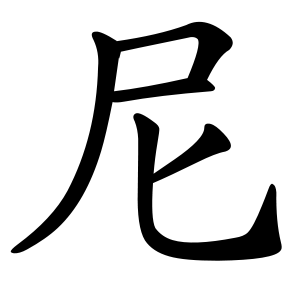尼
- a Buddhist nun;
- to restrain;
- to approach;
Etymology
Phono-semantic compound consisting of:
尸 (주검 시) — semantic component, originally representing a body or something reclining, here signifying bending, dwelling, or following closely.
匕 (비수 비) — phonetic component, providing the sound ní / ni and also suggesting something small or delicate.
According to Shuowen Jiezi (說文解字:
「尼,近也。从尸,匕聲。」
“尼 means ‘to approach’ or ‘to draw near.’ Formed from 尸 (‘body, to follow’) and phonetic 匕 (‘spoon’).”
The ancient graph depicts a person bent forward, symbolizing closeness, submission, or following.
Originally, 尼 expressed the idea of coming near or inclining toward, which later extended metaphorically to restraint and devotion.
The meaning “female monk” (女僧, bhikṣuṇī) was a later Buddhist borrowing, derived from the transliteration of the Sanskrit term bhikṣuṇī (比丘尼), in which 尼 represents the final syllable -nī, used as a marker for female monastics.
Usage in Korean
比丘尼 (비구니) — Buddhist nun
尼姑 (니고) — nun (colloquial, respectful form)
尼僧 (니승) — female monk; Buddhist nun
尼寺 (니사) — nunnery; convent
慈尼 (자니) — a kind and gentle nun (lit. “compassionate nun”)
尼姑庵 (니고암) — hermitage of nuns
Metaphorical / Classical uses:
親尼 (친니) — to come near, to approach
尼心 (니심) — self-restraint; devotion of heart
尼復 (니복) — to return again, to correct (archaic)
Additional notes
The character 尼 illustrates a fascinating semantic evolution — from approach and proximity to devotion and restraint, and finally to female monastic life.
In pre-Buddhist Chinese texts, such as the Zuo Zhuan (左傳), 尼 often appears in the sense of approaching or returning:
「不遠而尼。」
“He came near but did not enter.”
Here, 尼 describes the act of drawing near without transgression — a posture of reverent restraint.
With the introduction of Buddhism into China (circa 1st–2nd century CE), 尼 was adopted to render the Sanskrit suffix -nī, denoting the feminine form of bhikṣu (monk).
Thus, 比丘尼 (bhikṣuṇī) became the standard term for a female monk — one who lives in discipline and purity.
In Buddhist texts, 尼 came to symbolize renunciation and spiritual dedication, representing women who leave home life (出家) to pursue the path of enlightenment.
It embodies gentleness (柔), purity (淨), and restraint (戒) — qualities central to Buddhist monastic ideals.
Beyond its religious role, 尼 conveys the virtue of self-control and nearness to the Way (道).
The physical imagery of the character — a person bending or inclining — evokes humility and submission before truth.
In this sense, 尼 stands for the disciplined alignment of body and spirit, both literally (to approach holiness) and metaphorically (to draw near to moral clarity).
In poetry, 尼 often appears as a symbol of quiet devotion or gentle solitude.
For example, Tang poetry describes 尼姑庵 (nun’s hermitages) as serene spaces of meditation and withdrawal from worldly desire.
From bodily posture to spiritual devotion, 尼 captures the idea of humble closeness to truth — bending not in weakness, but in quiet reverence and inner strength.
Words that derived from 尼
- 尸心 (SP)
- ⿸ 尸 匕
